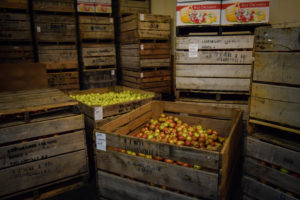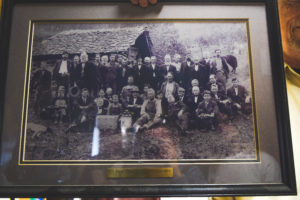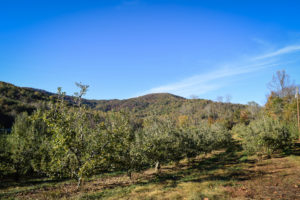By Kate Flinn
The average traveler passing through Taylorsville, North Carolina might not stumble across Deal Orchards. The orchard was at least a twenty-minute drive from what we believed to be downtown Taylorsville, though it was hard to be sure. After some back and forth, we detoured off Highway 64 in pursuit of one of the Foothills’ most celebrated Apple houses. The industrial sprawl of Taylorsville quietly slipped into rolling hills dotted with small shops and quaint farms. Though the drive seemed to stretch on mu ch longer than twenty minutes, the faded “Deal Orchards” sign eventually slipped onto the dashboard horizon.
The packed down dirt parking lot was full of cars and a bus of visitors from outside of town who had traveled to buy Deals apples. They filed in noisily, a moving hungry horde. Inside the orchard’s storefront was a large, open space; its high ceilings and large windows flooded the room with natural light. Boxes and boxes of apples populated the middle of the room, tempting visitors to explore the unique varieties one might only find in this region of the country. Along the perimeter of the shop were yellow shelves of various homemade jams and butters, cheeses, and produce that were visibly fresh, based on light packaging alone.
Approaching the counter, the woman behind the cashier smiled sweetly: “How can I help y’all?”
In response to some questions about this orchard we had stumbled across–how old it was, who was in charge–she responded with a short chuckle and replied, “Y’all are going to want to talk to Lindsay.” After making a call on her walkie-talkie, we stepped to the side and waited for “Lindsay” to come find us.
After a few minutes, the large wooden door a few feet behind the counter swung open, and a tall man who appeared to be in his seventies entered the room. The woman gave him a nod in our direction. The man took a few steps in our ge neral direction, and we were met face-to-face with Lindsay Deal: the man behind every aspect of the growing, harvesting and marketing for one of the largest, and oldest, apple orchards in North Carolina. His face was colored initially skeptical, noticeably sizing us up as outsiders. Upon a brief explanation, however, he was more than compliant to talk about North Carolina culture across the Foothills. He opened that same wooden door he had come through just a few minutes age before, and invited us into his office.
neral direction, and we were met face-to-face with Lindsay Deal: the man behind every aspect of the growing, harvesting and marketing for one of the largest, and oldest, apple orchards in North Carolina. His face was colored initially skeptical, noticeably sizing us up as outsiders. Upon a brief explanation, however, he was more than compliant to talk about North Carolina culture across the Foothills. He opened that same wooden door he had come through just a few minutes age before, and invited us into his office.
Lindsay gestured for everyone to take a seat in one of the three chairs nested between the heavy wooden desks and stacks of papers. The wood paneled walls of Lindsay’s office boasted an expansive collection of family photos, most of which appeared to be taken at the orchard over its various stages of existence. The office felt like a time capsule for the growth of this man’s family business.
Lindsay needed no encouragement to start talking about his family’s experience as apple growers. Lindsay’s great-grandfather planted the first Deal orchard back in 1939. “There were once 200 independent apple growers in this area,” he began. “We all used to pick our apples and then pedal them over in Winston and Charlotte.” Suddenly pushing back his faded leather desk chair, Lindsay walked over to a particularly large faded photo hanging on the wall. Pulling the frame down, he gazed at the photo of a group of men–all dressed in suits but for two pairs of overalls. A small plaque below the photo read, “The First Brushy Mountain Apple Growing Co-Op.” Lindsay went on to explain that in 1957, the growers in this area formed the Brushy Mountain Apple Growing Co-Op. Each grower contributed one thousand dollars and would bring the month’s pick to a single seller who would then sell their apples to the major grocery chains.
single seller who would then sell their apples to the major grocery chains.
“As time went on the way people bought apples began to change, so the way we sell them had to change as well,” Lindsay continued. Returning the frame to its rightful spot on the wall, his eyes lingered on the aged faces nostalgically–perhaps for the people in the photograph, or just for a simpler time. “People are more conscientious about their finances these days,” Lindsay said with a sigh. “They’re just buying enough apples to get them through the week, whereas they used to buy them in bulk.”
We learned that Deal Orchards was one of the first successful orchards established in Alexander County. With an aging population of apple growers in the region, much of Lindsay ’s competition has tapered out over the years, leaving just three or four primary orchards to spearhead the Foothill markets. Lindsay and his team have their process down to an absolute science and are Good Agriculture Practices-Certified. If you find yourself traveling through Alexander County, be sure to stop by the Deal Apple House and get a taste of what this family’s combination of passion and expertise has produced.
’s competition has tapered out over the years, leaving just three or four primary orchards to spearhead the Foothill markets. Lindsay and his team have their process down to an absolute science and are Good Agriculture Practices-Certified. If you find yourself traveling through Alexander County, be sure to stop by the Deal Apple House and get a taste of what this family’s combination of passion and expertise has produced.
